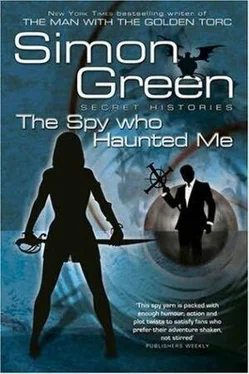“You’re weird,” said Peter.
“No,” Honey said immediately. “That’s Eddie.”
“I am not weird!” I said. “I’m just differently normal.”
No one had much to say after that, so we moved on, pressing farther into the city. Like most Soviet-designed cities, the streets were set out in a simple grid, and each street was just wide enough to let a tank through in case of insurrection. No signs of life anywhere, past or present. But after a while we began seeing signs of fighting, of armed struggle and mass destruction. Doors kicked in, or out.
Windows with little or no glass left in them. Fire damage, smoke-blackened walls, burnt-out homes. Whole buildings blown apart, reduced to single walls and piles of rubble. Some gave indication of being blown out from the inside. And lots and lots of bullet holes.
“There was a major firefight here,” said Walker. “Lots of guns, all kinds of calibre. Grenades and incendiaries too. So why aren’t we seeing any bodies?”
“The few soldiers who staggered out of this place spoke of monsters,” I said. “That is, those who weren’t so traumatised that they never spoke again. So who, or what, were they firing at? There must have been bodies at some point, soldiers and civilians. So who moved them?”
None of us had any answers, so we just kept walking. We passed one building so weakened and precarious that just the rhythm of our footsteps was enough to bring it down. It slumped forward quite slowly, almost apologetically, giving us plenty of time to get clear. The walls just folded up and fell apart, and the whole thing slammed down into the street. A great cloud flew up, as much dust as smoke, but the sound of the collapse was strangely muffled, and the echoes didn’t last. The silence quickly returned, as though it resented being disturbed.
Honey had her shimmering crystal weapon in her hand, glaring around her, ready for an attack or a target, but nothing showed itself. Part of a wall crumbled forward unexpectedly, and Honey whirled around and shot it. The vivid energy blast blew the brickwork apart, sending fragments flying through the air. We all ducked, and then straightened up and looked at Honey accusingly. She gave us her best I meant to do that look and made the crystal weapon disappear.
“Well done,” said Walker just a little heavily. “That wall will never jump out at anyone ever again. And if there are any survivors here, they now know for certain that they have visitors. Visitors with guns and a complete willingness to use them. Perhaps you’d like to shoot one of us in the foot while you’re at it?”
“Don’t tempt me,” said Honey.
“In dangerous situations, self-control is a virtue,” said Walker.
“Don’t you patronise me, you stuck-up Brit,” said Honey. “Sometimes you just have to shoot something.”
“Typical CIA,” said Peter.
We headed deeper into the city, and the evidence of hard fighting became more extreme. Whole buildings blown apart, leaving gaps in street terraces like teeth pulled from a jaw. Those left standing had been gutted by fires left to burn until they died down naturally. We checked inside a few of the safer-looking ruins. Still no bodies. There were long straight cracks in the walls, almost like claw marks, and gaping holes like jagged wounds. There was something . . . off about it all. I’ve seen my share of fighting and the damage it causes, but this was different. The pieces of what had happened here wouldn’t fit together, no matter how I arranged them.
And then we came to a street covered and caked in dried blood. More black than red, the great stain ran the whole length of the street, rising up in long tidal splashes along the sides of buildings, as though a great raging river of blood had swept from one end of the street to the other.
“So much blood . . .” Honey said thoughtfully. “How many people died here?”
“And who killed them?” said Peter, looking quickly about him.
“Still no bodies,” observed Walker, leaning casually on his umbrella and studying the scene with professional interest.
“Maybe something ate all the bodies,” I said. “Monsters, remember? Something’s still here. I can feel it. Watching us.”
“Hope it’s not rats,” Peter said abruptly. “Can’t stand rats. Not too keen on mice, either.”
“Oh, mice are no bother,” I said. “When I was a youngster, part of my duties at Drood Hall was to do a round before breakfast and check all the mousetraps. Then I’d take the filled traps to the toilets and give the little bodies a burial at sea. Used to make quite a ceremony out of it, when I was in the mood.”
“You see?” said Honey. “Weird.” And then she broke off, looking at me thoughtfully. “Eddie, you said earlier there was something very powerful not far from here, sleeping deep under the permafrost. Could it have anything to do with what’s happened here?”
“No,” I said immediately. “First, we buried him over a hundred miles away. And second, if he had even stirred in his sleep, we’d have known about it long before this. If he’d been involved with what happened here, it would have been much worse.”
“How much worse?” said Walker, professionally curious.
“Apocalyptically worse,” I said.
Walker shrugged. “Been there, done that.”
I didn’t challenge him. He probably had. I did once think about visiting the Nightside . . . and then had a nice lie-down with a cold compress on my head till the idea went away.
“Could this . . . thing, person, whatever have had anything to do with the Tunguska Event?” said Peter.
“No,” I said. “My family planted him centuries before that.”
“Something or someone that dangerous,” Honey said accusingly. “And you never told anyone?”
I met her gaze steadily. “It was Drood business. No one else’s. It wasn’t like there was anything you could have done. Then, or now. There’s a lot we don’t tell anyone else. Because if you knew, you’d never sleep well again. Droods guard humanity, in all senses of the word.”
Honey looked like she wanted to argue the point, but she could tell this wasn’t the time. She settled for giving me her best hard look, and then ostentatiously turned her back on me and glared at the blood-soaked street.
“So,” she said. “What were the scientists of X37 trying to achieve? Something to do with unlocking the hidden secrets and potential of human DNA. Potential . . . perhaps that’s the key word. Could they have been trying to produce psychic gifts to order? During the Cold War both sides put a lot of time and money into psychic research, hoping to produce people they could use as weapons.”
“Yeah,” said Peter, sniggering. “I saw that documentary. Trying to produce soldiers who could make goats fall over just by staring at them. Then there was that general of yours who was convinced he could learn to walk through walls if he could only concentrate just right. And let us not forget the whole remote-viewing fiasco . . .”
“We were getting really good results with that, towards the end,” said Honey, still not looking around.
“Yeah,” I said. “I heard. Problem was, you couldn’t keep them out of Pamela Anderson’s bedroom. Or George Michael’s bathroom.”
Honey’s stiff back positively fumed, while Peter and Walker and I exchanged smiles. I didn’t have the heart to tell Honey that the Droods sabotage all such government programmes, as a matter of course. We have the best farseers and psychics in the world, and we’re determined to keep it that way. We didn’t interfere with the fainting goats thing, though. Didn’t need to.
“This city covers a lot of ground,” said Walker. “We could spend whole days just walking up and down in it. And we don’t have days.”
Читать дальше












